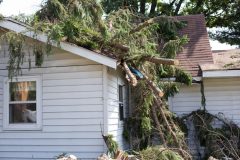The Role of Homeowners Insurance in Mortgage Approval
Here in the Peach State, you might be surprised to know that homeowners insurance and mortgage approval go hand-in-hand. In fact, a lender won’t even give you the money you need to buy the property without first seeing proof of your policy. You might also be wondering when do you buy homeowners insurance. The answer is pretty simple: before you finally sign off on the loan documents.
Lenders ideally want to see that the policy protects the property from all sorts of awful things like fires, Georgia’s famous thunderstorms, and other natural disasters. Some may even want to see that you make premium payments via an escrow account to avoid lapses in coverage.
What this all boils down to is this: It protects both you and the lender. Here’s what else you need to know about homeowners insurance and mortgages in Georgia.
Setting the Stage for Home Financing
When you apply for a mortgage, you’re asking the lender to put a lot of money on the line. To protect their investment, they want to ensure the property remains in good condition. This is where this product comes into play.
Mortgage lender requirements usually instruct borrowers to have a homeowners policy in place before finalizing the loan. This is not just a recommendation — it’s a must-have.
Coverage Essentials for Mortgage Approval
Mortgage home insurance requirements form a safety net for both you and the lender. These products cover the cost of repairs or rebuilding if your home is damaged by covered events like fires, storms, or vandalism.
Without it, a natural disaster could destroy the property, leaving the lender with a huge loss and you with a mortgage for a home that no longer exists. That would be what Gen Z and millennials like to call a “Big Yikes.” Because of this risk, lenders require you to get a homeowners policy as a condition for approving your mortgage. It just makes sense for both of you.
Why Lenders Insist on Insurance
So, why do mortgage lenders insist on it? The answer is all about a term called “risk management.” For lenders, the home serves as collateral for the loan. But what’s this collateral your lender is talking about exactly? Simply put: If you stop paying your mortgage, your lender has a tangible piece of property to take back through the court system.
If the property is damaged or destroyed, your homeowners policy ensures there are funds available to repair or rebuild it. This way, the lender’s investment remains protected.
Laws and Requirements in Georgia
You might be surprised to realize that it’s actually a common Georgia home insurance myth that you legally need a homeowners policy in the state. But there are very good reasons to have one anyway.
The requirement for a homeowners policy is not just a suggestion; it’s typically outlined in federal regulations. According to the Federal Emergency Management Agency (FEMA), lenders are required to ensure that properties in high-risk flood zones have flood protection as part of their mortgage approval process (42 U.S.C. 4012a). While not all homes require flood add-ons, all homes should have a standard homeowners policy.
Lenders follow these guidelines closely, and not having a homeowners policy can halt the mortgage process dead in its tracks. Some states have their own additional regulations. In Georgia, for example, the Georgia Office of Insurance and Safety Fire Commissioner emphasizes that homeowners protection is necessary for protecting the financial investment in a home, both for the homeowner and the mortgage lender.
Comprehending Coverage Types and Requirements
Understanding the “ifs” and “whats” of homeowners insurance required by your lender is crucial. At a minimum, mortgage lenders typically require a policy that insures the home for at least the amount of the loan. However, most homeowners policies offer several different types of protection:
- Dwelling Coverage: Covers the structure of your home, including walls, roof, and foundation. This is the primary protection about which lenders care.
- Liability Coverage: Protects you if someone is injured on your property. While important for you, this isn’t a primary concern for your lender.
- Personal Property Coverage: Covers your belongings, like furniture and electronics. Again, this is more for your protection than the lender’s.
- Additional Living Expenses (ALE): Covers costs if you have to live elsewhere while your home is being repaired. Lenders don’t usually require this, but it’s good to have.
It’s important to know that lenders often require specific coverage amounts and types to ensure full protection of their investment. For example, your lender might require you to carry “replacement cost” protection rather than “actual cash value” coverage:
Replacement cost covers the cost of rebuilding your home to its original state.
Actual cash value takes depreciation into account, potentially leaving you short on funds if you need to rebuild.

Minimum Coverage Spotlight
In Georgia, lenders require homeowners insurance that covers the full replacement cost of the home, ensuring enough dwelling coverage to rebuild the property in case of total loss (like if a megastorm wipes out your home or a fire burns it completely to the ground). Most lenders also require liability coverage, typically starting at $100,000, though specific amounts can vary depending on the bank.
If your property sits pretty in a designated flood zone, then your lender will want you to have flood protection covering either the replacement cost or the National Flood Insurance Program (NFIP) minimum.
Additionally, in areas prone to wind and hail damage, lenders may want separate or additional coverage for these perils. These requirements apply to both conventional loans and government-backed loans like FHA, VA, and USDA loans.
Customizing Policies Beyond the Basics
But what does homeowners insurance cover, exactly? Here are common customizations for Georgia policies:
- Floods: Added for properties in flood-prone areas.
- Windstorm and Hail Coverage: Increased protection for storm-prone regions.
- Hurricane Deductibles: Adjustable deductibles for coastal hurricane risks.
- Extended Replacement Cost Coverage: Ensures coverage for fluctuating construction costs.
- Sewer Backup Coverage: Protects against damage from sewer backups.
- Ordinance or Law Coverage: Covers costs to rebuild according to current building codes.
- Personal Property Endorsements: Additional protection for high-value items.
- Agricultural or Hobby Farm Coverage: Protection for small-scale farming activities and equipment.
Strategic Compliance: Meeting Lender Expectations
To meet your lender’s requirements, start researching a homeowners policy early in the mortgage process. This helps avoid rushed decisions and higher premiums. Lenders may require you to escrow insurance payments, meaning they’ll include the premiums in your monthly mortgage payment and pay the insurer directly, ensuring continuous coverage. A good agent can help you out here.
Common Pitfalls to Avoid in the Application Process
A common pitfall to avoid is underinsuring your home. Some buyers opt for the minimum coverage to save on premiums, but this can backfire. If your home is underinsured, you might not have enough funds to rebuild after a disaster, and your lender may not release the full loan amount. Moreover, if the lender determines that your coverage is insufficient, they may purchase insurance on your behalf — often at a higher cost and with less favorable terms than if you had chosen a policy yourself.
What if You Own Your Home Outright?
If you own your home outright, you will not be required to carry home insurance. But you don’t want to know what happens if you don’t have homeowners insurance at all. Imagine becoming homeless because you cannot afford to rebuild after a tragic loss.
Get a Home Insurance Quote
Why is homeowners insurance required? Now you know the scoop! Navigating the maze of mortgage requirements can seem daunting, but it’s a necessary part of securing a mortgage. Understanding the lender’s perspective — how a policy protects their investment — helps clarify why these requirements are so strict. By securing the right coverage, you’re not just meeting a lender’s demand; you’re protecting your most significant investment — your home.
Before moving forward with your mortgage, take the time to explore your policy options. Visit us today at Velox Insurance for competitive home insurance quotes tailored to your needs. And remember, being well-prepared with the right homeowners insurance can make all the difference in a smooth mortgage approval process. That’s why we also make it easy for you to give us a call at (855) 468-3569) or visit one of our offices in Georgia.



